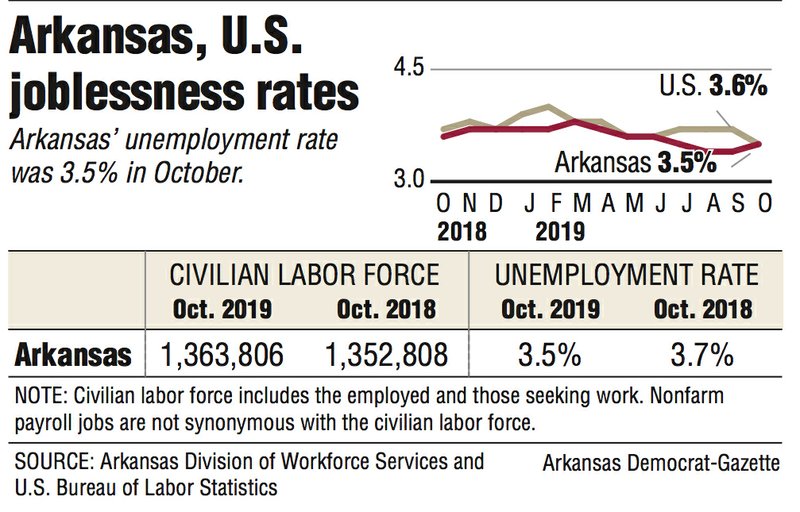Arkansas' unemployment rate held steady at 3.5% in October, according to U.S. Department of Labor data released Tuesday. That is lower than the national rate and the state's unemployment rate a year ago.
"There is not a whole lot to write home about," Michael Pakko, chief economist at the University of Arkansas at Little Rock, said about the report.
"The interesting part is the underlying numbers," he said.
The state's civilian labor force increased by 1,626 in October, data shows, a result of an additional 937 employed and 689 unemployed Arkansans. This shows continued employment growth and labor force expansion that, "in and of itself, is a good sign," Pakko said.
On a national level, the joblessness rate was at 3.6% in October. That's up from 3.5% in September and down from 3.8% in October 2018, data shows.
There were 12,736 more employed Arkansans in October compared with the same month a year ago, when the state's unemployment rate was 3.7%.
Greg Kaza, executive director of the Arkansas Policy Foundation, said there was good news and bad news in the numbers. As the economy nears full employment, the good news is that the state's unemployment rate is very low, Kaza said. The bad news: the state's payroll employment growth continues to trail the national average.
From June 2009 to October 2019, Arkansas had a growth rate of 10.4%, lower than the U.S. average of 16%. Ideally, it should have exceeded that, Kaza said.
"The state's economy is not firing on all cylinders," he said. "It's obviously firing above capacity in Northwest Arkansas, but in much of the state it's just not firing to capacity."
Nonfarm payroll jobs in Arkansas rose 5,800 month to month, totaling 1,291,700 in October, data shows. Most of the gains were at food processing plants and various companies in preparation for Christmas shopping and upcoming tax seasons, the labor force report said.
Of the jobs added, 2,100 were in the manufacturing sector; 1,800 in the professional and business services sector; and 1,400 in the trade, transportation and utilities sector.
Compared with October 2018, nonfarm payroll jobs rose by 18,500, with gains in eight key industry sectors. Five of them added 2,000 jobs or more.
Most of the gains were from food services (4,300), construction (3,800) and manufacturing (3,700), data shows. Jobs in financial activities and educational and health services are up by 2,000 from a year ago.
Overall, Pakko said manufacturing and construction really dominated year over year, with food services up for seasonal reasons. But the takeaway is the continued strength of manufacturing, he said.
Despite a 20-year trend of declines, "it continues to recover," Pakko said.
There were little to no job declines reported on a monthly or annual basis.
Business on 11/20/2019
